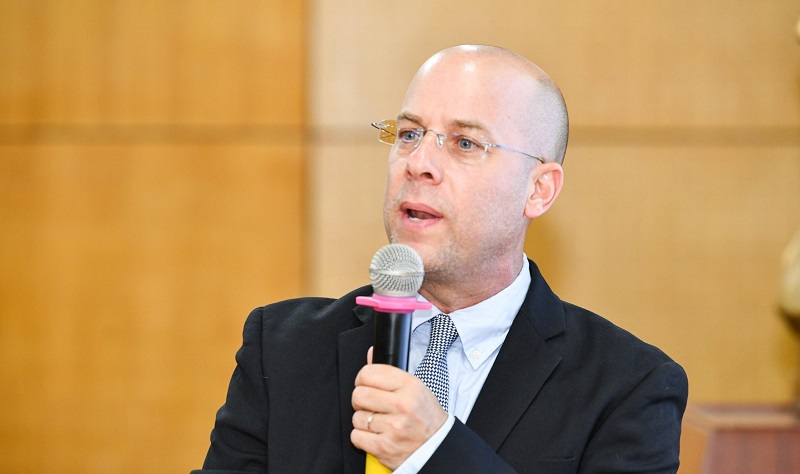Expanding startup community: Education is key
Specialists point to education as the foundation for the future prospects of Vietnamese entrepreneurs.
Vietnamese start-ups have the potential to go global and become technology unicorns. The journey may be long, and there is much to be done. The Hanoi Times talks to academics and experts about how to grow the country's startup community.
Dr. Truong Cong Tuan, Director of the Center for Student Innovation and Entrepreneurship – Hanoi University of Science and Technology
Dr. Truong Cong Tuan, Director of the Center for Student Innovation and Entrepreneurship – Hanoi University of Science and Technology. |
To help students with their startup projects, what are the Center's main activities?
As a member of the university ecosystem, the Center for Innovation and Startup defines four main tasks to help students develop their initiatives. These include organizing training courses to provide them, especially freshmen, with the necessary knowledge and skills to foster their entrepreneurial spirit. They are also encouraged to join specialized clubs to improve their skills. In addition, we have held competitions to select the best potential and feasible projects and place them in incubation programs for further development.
These projects will be funded by investors, including alumni of the university and partners of our institution.
What are the favorable conditions and what are the disadvantages that the center has to face?
We benefit from many activities that the university has done to support innovation and entrepreneurship. The university administration has also been very supportive in creating better conditions for students with business initiatives to continue their projects, thus making the university one of creativity and innovation. In addition, as I've mentioned before, we have an ecosystem of schools, companies, and research institutes that are well-connected. These entities create an environment full of facilities such as laboratories, specialized departments, and funds to invest in helping students thrive.
Meanwhile, the hardest part is how to encourage and get students more involved in startup projects. As the world keeps changing and needs disruptive solutions, we need to keep up to date with new trends, developments, and technologies, and then disseminate our knowledge to help students move forward with the most viable and appropriate ideas. Then there is the problem of keeping students inspired so that their ideas become practical and turn into real startup businesses. In my opinion, this is also the most difficult challenge for many universities, and Hanoi University of Science and Technology is no exception.
Another problem is the mobilization of funds. What happens if we use the state budget to support students' projects? If private investors are interested in the projects, it might be difficult to meet their standards and get their money. These are the obstacles that we have to solve in different ways to provide students with mental, technical, and financial support to move their projects forward.
What are the future steps that the center has in mind?
I hope that junior students will find it necessary to acquire the knowledge and skills related to their majors, which will pave the way for them to realize entrepreneurial projects. First of all, they should attend the training courses after entering the university. Through the training programs, they can see different ways to grow in the future, whether it is working in foreign-invested technology companies to become highly skilled engineers, or pursuing academic careers. They can even start businesses from their own ideas.
In addition, we will launch more startup contests for students, and the selection of the best ideas will be the focus of these contests. Hopefully, these initiatives will be strong enough to become new startup companies. Our hope is to attract external resources for the incubation and nurturing of the ideas so that they can one day become tech unicorns.
Itai Green, Founder and CEO of Innovate Israel
| Itai Green, Founder and CEO of Innovate Israel. |
How do you see technological disruption affecting the developing world?
You always try to make an economy more efficient and more productive, and technology is the tool that can boost productivity and growth. I think there is no other option for any countries, corporations, and governments than to promote innovation and incentivize big corporations to participate in the economy. Like Samsung and how you’ve worked with Samsung, such a giant enterprise is a great catalyst for more entrepreneurs with more creativity and the ability to realize their ideas.
It is quite clear that there is a lot of room for innovation among traditional businesses. Once corporations share their challenges with entrepreneurs, the latter would come up with their solutions and become startups. So I think there is a huge opportunity in a country of 100 million people and almost a million companies to take innovation and put it to work.
What are your thoughts on the opportunity for local companies to have a global reach and to have a deeper presence in the world of technology?
I think that once a startup has a good solution that fits real global challenges, it doesn't matter where it is established. I mean, as long as the solution is a relevant one to real pain, and in most cases, the pain of one corporation is the same pain for other corporations that are competing with this corporation, I see no reason why it is not adopted on a global scale.
I think that the main obstacle, the main challenge is to find a real pain, a real challenge. Then it's important to develop the solution and make it practical and find someone who's willing to pay for it. So once you have that, there is no limit to your ability to go global.
What steps can the domestic startup ecosystem take to ensure its continued success and expansion?
So, I think the more education for innovation, the more you promote innovation. The more you educate decision-makers about the importance of innovation, the more you incentivize big corporations to innovate. The lawmakers in the government should look around and learn from other countries, especially from the leading tech ecosystems, to adopt their ideas fast. There are many aspects of an effective ecosystem that can be learned and implemented quickly.
For example, in Israel, banks are required by law to have an innovation expert on each of their boards. It costs nothing to make it mandatory for banks and every company with more than 1,000 employees to have a board member who specializes in technology development. This is the only way you will get many institutional investors to put their money into companies that innovate. You will attract entrepreneurs to help big corporations solve problems. I mean, you can make a huge impact with just one decision.
Do you think it is possible for the education sector to work with the same solution?
Absolutely, because in every company these days there has to be one of the decision-makers who has a strong background in technology and innovation. Once you have that team and you trust them, they will drive it because they know where this market is going. They understand the importance of technology adoption. I think it's really a must because it creates a huge impact at no cost. Such a solution can update the DNA of the entity to our time because most entities are very traditional.
Thank you for your time!












